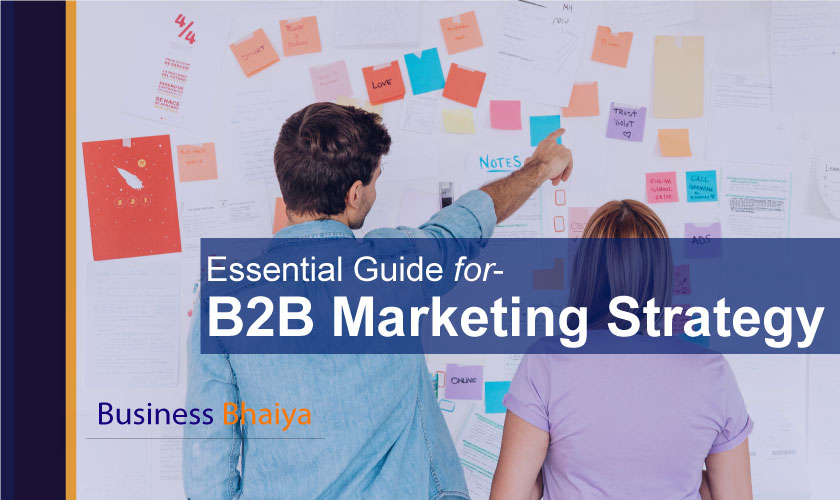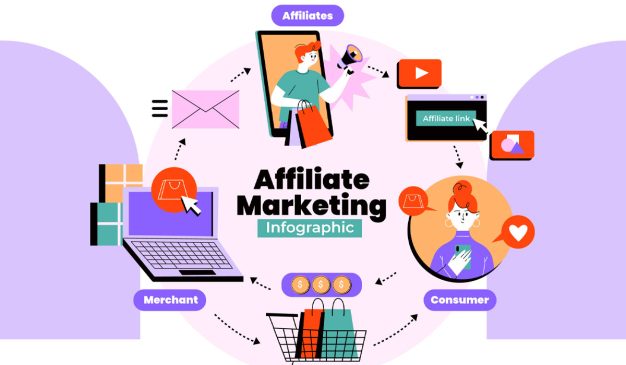In the dynamic world of business, where companies strive to outpace each other and secure their market presence, B2B marketing strategies play a pivotal role in driving growth and forging meaningful connections with other businesses. A well-crafted B2B marketing strategy not only propels sales but also establishes a strong brand identity and fosters enduring partnerships. This comprehensive guide unveils the core elements of an effective B2B marketing strategy, offering actionable insights for businesses to thrive in the ever-evolving marketplace.
B2B Marketing Strategy
In the fast-paced realm of business-to-business interactions, a well-crafted marketing strategy serves as a guiding star, steering companies towards growth and sustainability. Successful B2B marketing involves a holistic approach, combining strategic planning, compelling content, and innovative techniques to engage, educate, and convert potential clients.
Understanding B2B Marketing
Before delving into the intricacies of B2B marketing, it’s essential to grasp its essence. B2B marketing involves promoting products or services from one business to another. Unlike B2C marketing, which targets individual consumers, B2B marketing focuses on building relationships between businesses that can lead to long-term collaborations.
Setting Clear Goals
At the heart of every successful marketing strategy lies a set of well-defined goals. Identifying business objectives allows you to create a roadmap for your marketing efforts. The SMART goal framework—Specific, Measurable, Achievable, Relevant, and Time-Bound—provides a structured approach to goal-setting, ensuring that your efforts are aligned with your company’s overall mission.
Target Audience Segmentation
Segmentation forms the cornerstone of effective B2B marketing. By dividing your target audience into distinct segments, you can tailor your messaging to address their specific needs and pain points. Developing Ideal Customer Profiles (ICPs) provides a clear picture of your most valuable customers, enabling you to create personalized content that resonates with them.
Content Strategy: Educate and Engage
Compelling content serves as the bridge between your brand and your audience. Crafting informative and relevant content positions your business as a thought leader within your industry. Blogs, whitepapers, videos, and webinars are powerful tools that not only educate but also engage potential clients, nurturing trust and credibility.
Multi-Channel Approach
In the digital age, diversifying your marketing channels is crucial. From leveraging the reach of social media platforms to engaging in targeted email campaigns, a multi-channel approach ensures that your message reaches your audience through various touchpoints, increasing the likelihood of conversion.
Search Engine Optimization (SEO)
Visibility in search engines is paramount in today’s online landscape. Implementing effective SEO strategies, such as thorough keyword research and high-quality backlink building, boosts your website’s visibility, driving organic traffic and enhancing your brand’s online presence.
Data-Driven Insights
In the realm of B2B marketing, data is your compass. Analytics tools provide valuable insights into the effectiveness of your campaigns, enabling you to make data-driven decisions. Continuous monitoring and A/B testing allow you to refine your strategies for optimal results.
Building Trust Through Case Studies
Nothing speaks louder than real success stories. Case studies showcase how your products or services have positively impacted your clients’ businesses. Highlighting these success stories instils confidence in potential clients, demonstrating your ability to deliver tangible results.
Personalized Approach: Account-Based Marketing (ABM)
Account-Based Marketing (ABM) tailors your marketing efforts to specific high-value accounts. By focusing your resources on these accounts, you can create highly personalized campaigns that resonate deeply, fostering stronger relationships and increasing the likelihood of conversion.
Leveraging Influencer Partnerships
Influencers hold the power to amplify your brand’s reach. Identifying influential figures within your industry and collaborating with them can provide a significant boost to your credibility and exposure. Their endorsement adds a layer of trust to your offerings.
Social Proof and Testimonials
In the B2B landscape, social proof is a potent tool. Displaying testimonials from satisfied clients showcases your track record of excellence. Social proof helps potential clients feel more confident in choosing your business over competitors.
Competitive Analysis
Understanding your competitors is integral to gaining a competitive edge. A thorough analysis of the competitive landscape helps you identify your unique selling points (USPs) and address market gaps, ensuring that your offerings stand out.
Continuous Adaptation and Innovation
B2B marketing is not static; it’s a dynamic arena where trends evolve rapidly. Embracing change and incorporating technological advancements into your strategies keep you at the forefront of the market, ready to adapt to new opportunities and challenges.
Measuring ROI and Performance
The success of your B2B marketing strategy hinges


